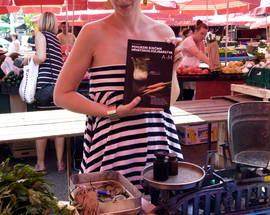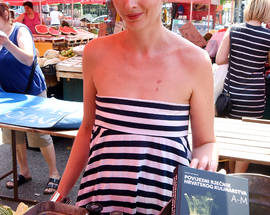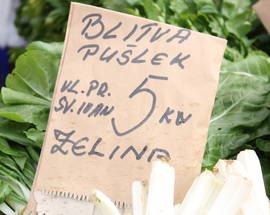At Dolac for Grincajg and Pušlek
more than a year ago
Croatia is a country rich with islands and greenery, as well as national traditions, but if there is anything that there is plenty of here, it's the words that describe food and everything related to food. Our nation has been 'playing' with words for ages, and just how large and diverse that lexis is Jelena Ivanišević knows and with the Institute of Ethnology and Folklore she compiled and processed the "Croatian Culinary Historical Dictionary A-M." It is the first dictionary of its kind in Croatia and soon the second volume will also be published, which is not surprising given the large differences between the dialects, from village to village, and from town to town, where the same things are called different names or the same word means a few different things.
- The book has grown as part of a study on gastronomy in Croatia, as part of a research project on dietary changes that have taken place and are happening in the 20th and this part of the 21st century. We came up with the idea to create a dictionary to show all that is included under the term gastronomy for us, how much lexical richness we have, and then as well, culture - said Ivanišević.
The dictionary aims to show all that comes under the term gastronomy for us, how we've shaped our culinary history and present, the foods, dishes, procedures, kitchen equipment. The first volume already has 8393 entries! One should not, therefore, wonder why the tourists, guests from abroad, are so happy to visit our markets, particularly the Zagreb Market Dolac.
- Food is the easiest medium through which one can experience a culture. If you have any hedonistic sensibility, food is a good way to enter any culture. And then it is logical that Dolac, as an open market, as a life stage in the middle of the city, is always interesting. It is interesting, especially for those who come from countries that did not preserve this form of market. It's a great place for communicating, for socializing and various rituals, where you see what’s new each season, where you can exchange recipes and ultimately, unlike in a store, you can try everything - explains Ivanišević.
My advice is - when you're at Dolac, talk to the kumice, the women selling their produce!
- Absolutely! Not long ago I was asked by a stranger how do we say tomato. Because in Zagreb he saw paradajz, and at the market in Split poma was written. And I say to him, you say rajčica!
Kumice are open to all questions. It's the zero level where you can familiarize yourself with something new, where you can just ask what can be done with different foods and what we call them. There you can feel food, taste it, you can see wild strawberries, blueberries, fruits not grown but rather collected, that have more taste, smell better - said Ivanišević.
At the same time, it should be known that Zagreb and its surroundings kept its Germanism due to the fact that Croatia used to be an integral part of the great Austro-Hungarian Empire.
- Croatian cooks started coming out relatively late, in the early 19th century. German names were standardly used for a good part of even the 20th century. For example, ajngemahtes, or ajnkmoc, a type of thick soup with various vegetables, usually either from veal or chicken pieces with dumplings. It’s an ingenious spring dish, and whoever tried to think of a Croatian name for it did not succeed, the people did not accept it - says Ivanišević.
There are still such names. For example, grincajg!
- Which is a small bundle of all the vegetables that you need for soup. In fact, I do not know why the Tourist Board does not use it as a trademark for the City of Zagreb, because you really don’t have it anywhere else. There is also another combination. Let's say in Zagreb you buy a pušlek of spring onions or chard. At the sea it’s called mac- explains the author.
And how is such a big dictionary being made? Ivanišević admits - it's being made slowly!
- It’s done in a way that you start learning words for a language which you thought you already understood well and had a very rich vocabulary in. And then you see that words adjust to the time just like everything else does. You see that through the words you can actually follow when some phenomenon, some tradition, some dish entered the language - Ivanišević said.
She added that while working on the dictionary, she also adopted some new terms. For instance, for her, a woman from Zagreb, she liked the word mumati which is used by people from the coast when someone eats with gusto.
- When I was a kid at my house eating pasta with meat, some people called it kajzerflajš, then the pasta with meat suddenly became bolognese. And nowadays we all call it that and eat it- recalls Ivanišević.
Judging by the bolognese, it would seem that when it comes to food, Croatia has been a part of Europe for a long time!?
- When it comes to food, there is no limit! - concludes Ivanišević.
That's why you must visit Dolac. If for nothing else but grincajg and pušlek!
Jelena Ivanišević - Na Dolac po grincajg i pušlek
Hrvatska je zemlja bogata mnogočim, recimo s otocima i zelenilom, ili pak narodnim običajima, no ako ičega ima napretek onda su riječi kojima se opisuje hrana i sve uz hranu vezano. Riječima se naš narod 'igra' od davnina, a koliko je taj leksik velik i raznolik zna Jelena Ivanišević s Instituta za etnologiju i folkloristiku koja se uhvatila posla pa sastavila i obradila »Povijesni rječnik hrvatskog kulinarstva A-M«. Prvi je to rječnik takve vrste u nas, uskoro će u tisak i drugi svezak, što i ne čudi s obzirom na velike razlike koje postoje između dijalekta, na činjenicu da se od sela do sela, od grada do grada iste stvari zovu različitim imenima ili ista riječ označava nekoliko stvari.
- Knjiga je izrasla kao dio projekta proučavanja prehrambene kulture u Hrvatskoj, u sklopu projekta istraživanja prehrambenih promjena koje su se događale i događaju u 20. i ovom komadiću 21. stoljeća. Došli smo na ideju da napravimo rječnik ne bi pokazali što sve u nas ulazi u pojam gastronomije, koliko je to leksičko bogatstvo, a onda zapravo i kulturno – ističe Ivanišević.
Rječnik nastoji pokazati što sve kod nas ulazi u pojam gastronomije, što nam oblikuje našu kulinarsku povijest i sadašnjost, koje namirnice, jela, postupci, kuhinjska oprema. Građa samo prvog sveska je 8393 natuknica! Ne treba se stoga čuditi što turisti, gosti iz inozemstva, tako rado obilaze naše tržnice, poglavito zagrebački Dolac.
- Hrana je najlakši medij preko kojeg se može doživjeti neka kulture. Ako imate imalo hedonističkog senzibiliteta hrana je dobar ulaz u bilo koju kulturu. I onda je logično da je Dolac, kao otvoreni plac, kao životna pozornica usred grada, uvijek zanimljiv. Zanimljiv je pogotovo onima koji dolaze iz zemalja koje nisu sačuvala taj oblik placa. To je zgodno mjesto na kojem se komunicira, na kojem se odvija druženje i razni rituali, na kojem vidite što je novoga u sezoni, na kojem razmjenjujete recepte i na kojem, u krajnjoj liniji i za razliku od trgovine, sve možete kušati - pojašnjava Ivanišević.
Savjet je – kad ste na Dolcu, razgovarajte s kumicama!
- Apsolutno! Nema dugo da me pitao jedan stranac kako se kod nas točno kaže paradajz. Jer u Zagreb vidi paradajz, a u Split na Pazaru piše poma. A ja mu velim, kaže se rajčica! Kumice su otvorene za sva pitanja. To je ona nulta razina da se upoznate s nečim novim, da neposredno pitat što s tim namirnicama valja činiti i kako se u nas zovu. Tu se hrana može opipat, kušati, mogu se vidjeti šumske jagode, borovnice, plodovi koji nisu uzgojeni nego sakupljeni, koji imaju više okusa, bolji miris – kaže Ivanišević.
Valja pri tom znati da se Zagrebu i njegovoj okolici zadržalo poprilično germanizama zahvaljujući činjenici da je Hrvatska nekad bila sastavni dio velike Austro-Ugarske monarhije.
- Hrvatske kuharice su relativno kasno počele izlaziti, početkom 19. stoljeća. Njemački nazivi su standard dobrim dijelom i u 20. stoljeću. Recimo, ajngemahtes, ili ajnkmoc, vrsta guste juhe s raznim povrćem, obično ili od teletine ili pileće sitneži s noklicama. Genijalno je to proljetno jelo, a tko god je pokušao smisliti za njega hrvatski naziv nije u tome uspio, odnosno nije ga narod prihvatio – kazuje Ivanišević.
Ima takvih naziva još. Recimo, grincajg!
- To je mali zavežljaj u kojem je sve povrće koje vam treba za juhu. Zapravo, ne znam zašto ga turistička zajednica ne iskoristi kao zaštitni znak Grada Zagreba, jer ga doista nema nigdje drugdje. Ima još kombinacija još. Recimo u Zagrebu se kupuje pušlek mladog luka. Ili blitve. Uz more je to mac – pojašnjava autorica.
A kako se radi ovako velik rječnik? Ivanišević priznaje – radi se sporo!
- Radi se tako da krenete iznova učiti leksik jezika za kojeg mislite da ga jako dobro razumijete i da imate jako bogat vokabular. A onda vidite se riječi prilagođavaju vremenu kao i bilo što drugo. Vidite da se kroz riječi zapravo može pratiti kada je neka pojava, neki običaj, neko jelo ušlo u jezik – veli Ivanišević.
Dodaje kako je, radeći na rječniku, i sam usvojila neke nove pojmove. Recimo, njoj Zagrepčanki svidjela se riječ mumati što se uz more koristi kad se želi reći da netko s uživanjem jede.
- Kad sam bila mala kod mene doma se jelo tijesto s mesom, kojeg su neki zvali kajzerflajš, a onda je tijesto s mesom odjedanput postao bolonjez. I sada ga svi tako zovemo i jedemo – prisjeća se Ivanišević.
Sudeći prema bolonjezu, reklo bi se da je Hrvatska kada je hrana u pitanju, odavno u Europi i dio nje!?
- Kada je hrana u pitanju, granica nema! – zaključuje Ivanišević.
Zato valja na Dolac. Ako ništa po grincajg i pušlek!
By Siniša Pavić








Comments